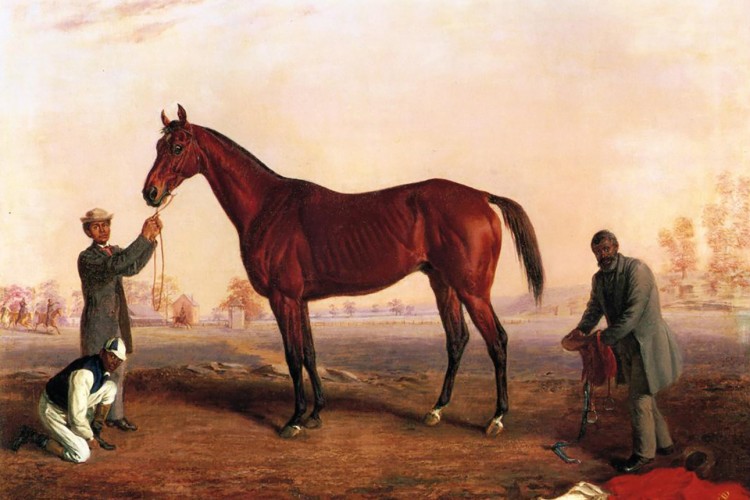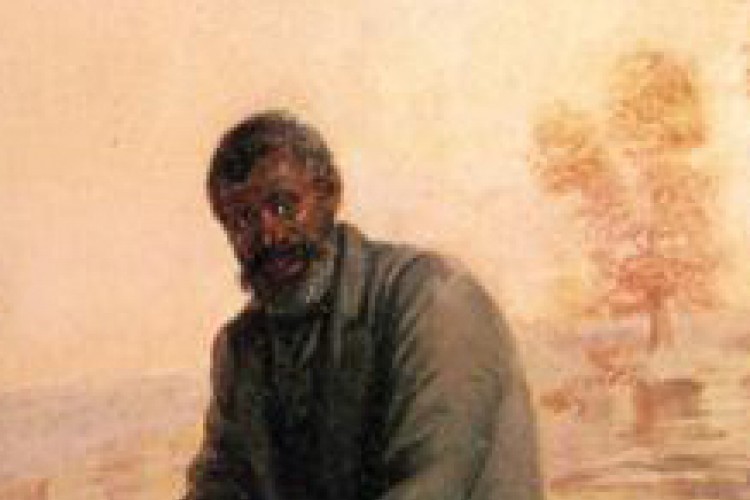William Walker, Sr.
Childhood and Family
William “Billy” Walker was born into enslavement in 1860 at the Bosque Bonita Farm in Woodford County, Kentucky. Researchers are seeking more information about his parents in archive records. William Walker married Hannah Estill at the home of Isaac and Lucy Murphy in June 1891.1 They were parents of two children, William, Jr. and Sadie.2
Early Career
Walker began working with horses at an early age and rode in his first race at eleven years old at Jerome Park. At thirteen years old, Walker won his first race aboard the horse Astral during the 1873 Lexington fall meet.3
Jockey Career: Early Kentucky Derbies
Walker rode in the very first Kentucky Derby, held in 1875. Walker took fourth place aboard the horse Bob Wooley. The next year, Walker rode the horse Bombay and again took fourth place.
Walker won the 1877 Kentucky Derby aboard Baden-Baden by a two-length victory. Edward Dudley Brown, another successful African American in the Thoroughbred racing industry, trained Baden-Baden.4
Walker rode for the fourth and final time in the 1896 Kentucky Derby, and placed seventh on the horse The Winner.
Other Career Highlights
Walker had many other victories besides the Kentucky Derby. In 1875, he won the following races with the horse King Alfonso:
● Tobacco Stakes
● Galt House Stakes
● St. Leger Stakes
Walker rode Himyar and Ten Broeck in nearly all these horses’ major races.5 In 1878, Walker rode Ten Broeck in a famous match against the horse Mollie McCarthy and won. This race between two rivals was so notorious that the folk song “Molly and Tenbrooks” memorialized it.6
Training Career
After retiring from his career as a jockey in 1896, Walker became a trainer for Jake Greenburg of Louisville and breeding advisor to John Madden.7 A newspaper described Walker as “one of the keenest judges of horseflesh in this state.”8
Walker trained the horse Round the World, the favorite for the 1911 Kentucky Derby. In 1917, he brought fourteen yearling horses to race at Churchill Downs with moderate success.9
Legacy
Walker faithfully attended every Kentucky Derby until his death in 1933.10 He was buried in the Louisville Cemetery but his grave did not receive a headstone. Prior to the 1996 Kentucky Derby, Churchill Downs worked with Muldoon Memorials to place a granite headstone there to commemorate Walker and his career.11
The Louisville and Jefferson County African American Heritage Committee, Inc. created a highway marker, also placed at the Louisville Cemetery. It describes Walker’s life and achievements.12
In 2015, a new race at Churchill Downs was created in his honor to replace the Derby Trial. The race, entitled the $100,000 William Walker Stakes, is a six furlong race open to three-year-olds. It kicks off Derby Week.13
Sources
Appleton Jr., Thomas H., and Melba Porter Hay. n.d. Roadside History: A Guide to Kentucky Highway Markers.
“Colored Marriage Book.” 1891. Fayette County Clerk.
Daily Racing Form. 1911. “Jockeys Whose Skill Played Part in Kentucky Derbys of the Past,” May 12, 1911. The Daily Racing Form Archive. University of Kentucky Libraries.
———. 1917a. “Baden-Baden’s Big Year: Incidents of a Race in Which Some Great Colts Were Beaten,” March 18, 1917. The Daily Racing Form Archive. University of Kentucky Libraries. https://drf.uky.edu/catalog/1910s/drf1916031301/drf1916031301_1_2#q=baden-baden+AND+walker#fq=.
———. 1917b. “Rode in the First Kentucky Derby: William Walker’s Long Experience as a Jockey and Afterwards as a Trainer,” March 18, 1917. The Daily Racing Form Archive. University of Kentucky Libraries.
———. 1917c. “Young Horses in W. Walkers Care: Promising Band of Fourteen Yearlings Are Quartered at Churchill Downs,” December 25, 1917. The Daily Racing Form Archive. University of Kentucky Libraries.
———. 1932. “Billy Walker At The Derby,” May 7, 1932. The Daily Racing Form Archive. University of Kentucky Libraries.
———. 1937. “Early Days of The Kentucky Derby: Eventful Happenings in History-Making Years of America’s Outstanding Horse Race,” May 8, 1937. The Daily Racing Form Archive. University of Kentucky Libraries. https://drf.uky.edu/catalog/1930s/drf1937050802/drf1937050802_36_1#q=baden-baden+AND+walker#fq=.
Kelly, Jennifer. 2018. “William S. Walker, Jock of All Trades.” The Sir Barton Project (blog). February 15, 2018. https://thesirbartonproject.com/2018/02/15/william-s-walker-jock-of-all-trades/.
Lexington Leader. 1891. “Colored Social Events,” June 10, 1891.
———. 1905. “Turf Gossip: Walker to Train for Jake Greenburg,” October 7, 1905.
Louisville Courier-Journal. 1996. “Grave Unmarked No More: Racing Great William Walker Finally Gets a Fitting Memorial,” April 30, 1996, sec. Kentucky section.
Rogers, Darren. 2015. “Derby Trial Renamed Pat Day Mile, Moved to Kentucky Derby Day; 25 Stakes Total $8.05 Million.” Churchill Downs. February 6, 2015. https://www.churchilldowns.com/news/archive/derby-trial-renamed-pat-day-mile-moved-kentucky-derby-day-25-stakes-total-805-million.
The Washington Times (D.C.). 1905. “Turf Gossip,” October 8, 1905, sec. Latest Sporting News.
“Walker, William, Sr. ‘Billy.’” n.d. In Notable Kentucky African Americans Database. Accessed April 3, 2020. https://nkaa.uky.edu/nkaa/items/show/1906.
Citation
When citing this article as a source in Chicago Manual of Style use this format: Last name, first name of Author. Chronicle of African Americans in the Horse Industry. n.d. “Title of Profile or Story.” International Museum of the Horse. Accessed date. URL of page cited.
- 1“Colored Marriage Book.”; “Colored Social Events.”
- 2“Twelfth Federal Census, 1900 Jefferson County, Kentucky.”
- 3“Rode in the First Kentucky Derby.”
- 4Project, “William S. Walker, Jock of All Trades.”
- 5“Rode in the First Kentucky Derby.”
- 6Rosenberg, Bluegrass, 84.
- 7“Turf Gossip: Walker to Train for Jake Greenburg.”
- 8“Young Horses in W. Walkers Care.”
- 9“Jockeys Whose Skill Played Part in Kentucky Derbys of the Past.”
- 10“Billy Walker At The Derby.”; Rogers, “Derby Trial Renamed Pat Day Mile.”
- 11“Grave Unmarked No More: Racing Great William Walker Finally Gets a Fitting Memorial.”
- 12Appleton Jr. and Hay, Roadside History, 253.
- 13Rogers, “Derby Trial Renamed Pat Day Mile.”






